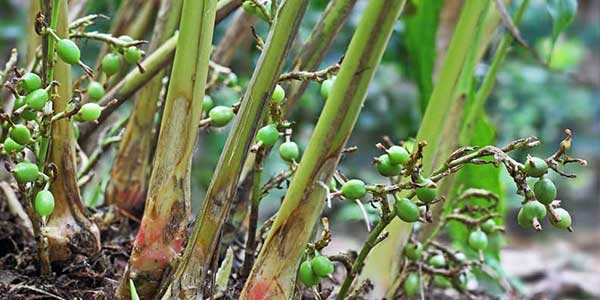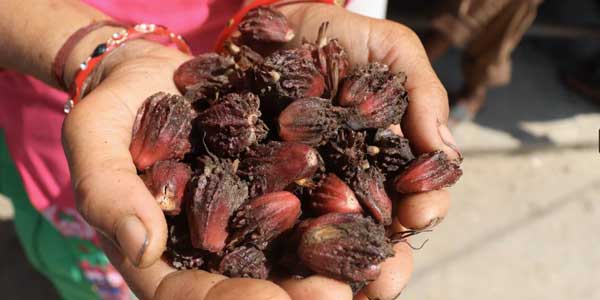Introduction
Black cardamom, or Badi Elaichi, is a versatile and aromatic spice widely used in cooking for its distinct flavor and fragrance. It is a key ingredient in many cuisines around the world. In this article, we will delve into the details of black cardamom, including its uses, qualities, origin, sources, applications, health benefits, use in cooking, how to use it, and potential side effects. By the end of this article, you will have a comprehensive understanding of black cardamom and its role as a cooking ingredient.
I. Origin and Sources of Black cardamom, or Badi Elaichi
Black cardamom is native to the Indian subcontinent and is primarily grown in countries such as India, Nepal, Bhutan, and China. It is obtained from the plant species Amomum subulatum, which belongs to the ginger family (Zingiberaceae). The pods of the black cardamom plant are harvested and dried, resulting in the distinct aromatic spice.
Black cardamom pods are larger and darker in color compared to green cardamom, which comes from a different plant species. The pods have a smoky aroma with a warm, earthy flavor profile. Black cardamom is commonly used in Indian, Tibetan, and Nepalese cuisines for its bold and intense flavor.

II. Qualities of Black Cardamom
Black cardamom possesses several unique qualities that make it a prized cooking ingredient. Some key qualities of black cardamom include:
Distinct Flavor: Black cardamom has a strong, smoky flavor with hints of resin and camphor. Its flavor profile is deeper and more intense than that of green cardamom.
Aromatic Fragrance: Black cardamom pods have a rich and robust aroma, which becomes more pronounced when the pods are crushed or heated.
Bold and Spicy: The flavor of black cardamom adds depth and complexity to dishes. It has a warm spiciness that complements savory and robust flavors.
Versatility: Black cardamom is a versatile spice used in both savory and sweet dishes. It pairs well with meats, rice, lentils, and a variety of spices.
Essential Oil Content: Black cardamom contains essential oils, including cineole, which contribute to its distinct aroma and potential health benefits.
III. Culinary Uses and Applications of Black cardamom, or Badi Elaichi
Black cardamom is a versatile spice that can elevate the flavor of various dishes. Here are some popular culinary uses and applications of black cardamom:
Spice Blends and Curries: Black cardamom is often used in spice blends such as garam masala, curry powders, and other masalas. It imparts a smoky and robust flavor to these blends and enhances the overall taste of curries and gravies.
Meat and Poultry: Black cardamom is commonly used in meat and poultry dishes. It pairs well with rich and hearty flavors and adds depth to dishes like biryanis, stews, and roasted meats.
Rice and Pulao: Black cardamom is a key ingredient in aromatic rice dishes and pulaos. It infuses the rice with its smoky flavor and complements other spices and ingredients.
Lentils and Legumes: Black cardamom can be added to lentil and legume preparations, such as dal or soups, to enhance their flavor. It adds a unique smokiness and depth to these dishes.
Infused Drinks and Teas: Black cardamom pods can be crushed and added to hot beverages like tea or coffee for a distinct flavor and aroma. It is also used in herbal teas and traditional Ayurvedic preparations.
Desserts and Baking: Black cardamom can be used in desserts and baking, particularly in recipes that call for a robust and aromatic flavor. It pairs well with chocolate, cinnamon, and other warm spices.

IV. Health Benefits of Black Cardamom
Black cardamom offers not only a delightful flavor but also several potential health benefits. Here are some of the key health benefits associated with black cardamom:
Digestive Health: Black cardamom has carminative properties, which can aid digestion, reduce bloating, and alleviate gastrointestinal issues such as indigestion and flatulence.
Anti-inflammatory Effects: The essential oils present in black cardamom, such as cineole, exhibit anti-inflammatory properties. They may help reduce inflammation in the body, which can be beneficial for conditions like arthritis and digestive disorders.
Respiratory Health: Black cardamom has traditionally been used to relieve respiratory conditions such as cough, bronchitis, and asthma. It acts as an expectorant, helping to expel mucus and alleviate congestion.
Oral Health: Black cardamom contains antimicrobial properties that can help maintain oral health. Chewing on black cardamom pods or using cardamom-infused mouthwashes may help combat bad breath, prevent cavities, and reduce oral bacteria.
Antioxidant Activity: Black cardamom is rich in antioxidants that can help neutralize harmful free radicals in the body. Antioxidants protect cells from damage and may contribute to overall health and well-being.
Potential Anti-cancer Properties: Some studies have suggested that black cardamom may possess anti-cancer properties due to its antioxidant and anti-inflammatory effects. However, more research is needed to establish its specific mechanisms and efficacy.
It’s important to note that while black cardamom offers potential health benefits, it should not replace medical treatment or professional advice. If you have specific health concerns or conditions, it’s best to consult with a healthcare professional before incorporating black cardamom into your diet.

V. How to Use Black Cardamom in Cooking
Using black cardamom in cooking is relatively simple, but it’s essential to use it judiciously due to its potent flavor. Here are some tips on how to use black cardamom effectively:
Whole Pod Usage: Black cardamom pods are usually used whole in cooking. They are added to dishes during the cooking process to infuse their flavor. The pods are typically crushed slightly before adding them to release the aromatic oils.
Dry Roasting: Dry roasting black cardamom pods before using them in recipes can intensify their flavor. Heat a skillet over low heat and roast the pods until they become fragrant. Be cautious not to burn them.
Infusion Method: To impart a milder flavor, you can infuse black cardamom in dishes by adding the whole pods to simmering liquids such as soups, stews, or rice dishes. Remove the pods before serving.
Grinding: If desired, you can grind black cardamom seeds from the pods into a powder using a spice grinder or mortar and pestle. Ground black cardamom is used in spice blends or recipes that require a fine texture.
Balancing the Flavor: Black cardamom has a strong and smoky flavor, so it’s essential to balance its intensity with other spices and ingredients. Experiment with small quantities until you achieve the desired flavor profile.
Complementary Pairings: Black cardamom pairs well with other warm spices like cinnamon, cloves, cumin, and coriander. It also complements ingredients such as ginger, garlic, onions, and tomatoes in savory dishes.
VI. Potential Side Effects and Precautions of Black cardamom, or Badi Elaichi
While black cardamom is generally safe for consumption, some individuals may experience certain side effects or allergic reactions. It’s important to be aware of these potential side effects and take necessary precautions:
Gastrointestinal Issues: In some cases, excessive consumption of black cardamom or sensitivity to its compounds may cause digestive discomfort, including heartburn, stomach upset, or diarrhea. If you experience any of these symptoms, reduce or avoid the consumption of black cardamom.
Allergies: Allergic reactions to black cardamom are rare but possible, especially for individuals with known allergies to other spices or plants in the ginger family. If you have a known allergy, it’s best to avoid black cardamom or seek medical advice before using it.
Interaction with Medications: Black cardamom may interact with certain medications, such as anticoagulants or blood-thinning drugs. If you are taking any medications, it’s crucial to consult with a healthcare professional to ensure there are no potential interactions.
Pregnancy and Breastfeeding: Pregnant and breastfeeding women should exercise caution when consuming black cardamom. While there is limited research on its safety during these periods, it’s advisable to consult with a healthcare professional for personalized advice.
It’s important to note that these side effects are rare, and black cardamom is generally well-tolerated when used in moderation. However, if you have any concerns or underlying medical conditions, it’s always best to consult with a healthcare professional.
Conclusion
Black cardamom, also known as Badi Elaichi or black cardamom, is a versatile and aromatic spice that adds depth and complexity to various dishes. With its distinct flavor, smoky aroma, and numerous culinary applications, black cardamom has become an integral part of many cuisines.
From savory curries and rice dishes to desserts and beverages, black cardamom offers a unique and bold flavor experience. It also possesses potential health benefits, including aiding digestion, providing anti-inflammatory effects, and promoting respiratory health.
When using black cardamom in your cooking, remember to balance its strong flavor with other spices and ingredients. Whether you use whole pods, roasted seeds, or ground powder, black cardamom can enhance the taste of your culinary creations.
While black cardamom is generally safe for consumption, it’s essential to be mindful of potential side effects and allergies. It’s recommended to use black cardamom in moderation and consult with a healthcare professional if you have any concerns or specific health conditions.
Embrace the aromatic allure of black cardamom and explore its potential in your kitchen. Let this exquisite spice elevate your culinary creations and delight your taste buds with its robust and captivating flavor.